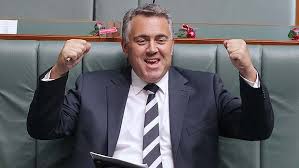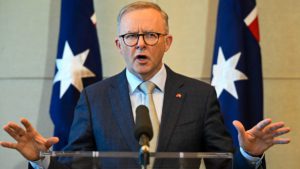(Update: A spokeswoman for Opposition’s Greg Hunt said funding or ARENA would be cut over the forward estimates, but details of the cuts would not be released until next week).
The Coalition has confirmed that not only does it want to repeal the carbon price should it win power next week, it will also take an axe to associated energy efficiency and renewables programs to help pay for its budget promises, including the Australian Renewable Energy Agency.
A document released by Opposition Treasurer spokesman Joe Hockey on Wednesday outlined the extent of the cuts proposed to help the Coalition meet its spending commitments.
Most of the cuts will come from compensation not needed once the carbon price is withdrawn (although households keep theirs).
But other programs as the Clean Technology Program, which assisted renewable projects such as solar PV and energy efficiency programs, as well as energy efficiency information grants, will also be terminated.
A total of $1.5 billion is targeted for savings linked programs considered “wasteful or will no longer be required” – which is expected to include the Clean Energy Finance Corporation, and possibly even cuts to the Australian Renewable Energy Agency.
ARENA was mentioned by Hockey in a news conference this morning, and a spokeswoman for Greg Hunt confirmed unspecified cuts over the forward estimates. Details will be released next week, she said. The Labor government has already trimmed ARENA’s budget to $3 billion from $3.2 billion, and deferred some of the planned spending out to 2022.
The coalition says it will save $400 million from land sector initiatives and from closing institutions such as the Climate Change Authority.
Here is an excerpt from the statement:
Abolishing the remaining spending linked to the carbon tax will deliver savings of $7.5 billion.
- • Discontinuing the business compensation measures introduced to provide partial relief to selected sectors and industries for the hit from the carbon tax ($5.1 billion) – including:
o Removal of the increase in the instant asset write-off threshold to $6,500 ($0.2 billion);
o Discontinuing the Jobs and Competitiveness Program ($4.0 billion); Discontinuing the Steel Transformation Plan ($0.1 billion);
o Discontinuing the Clean Technology Program ($0.4 billion);
o Discontinuing the Coal Sector Jobs Package ($0.3 billion); and
o Discontinuing other small Clean Energy Future business compensation measures including the Energy Efficiency Information Grants, the Clean Energy Skills package, and the Clean Technology Focus for Supply Chain programs;
- Discontinuing energy market compensation measures which will no longer be needed once the carbon tax has been scrapped ($0.5 billion);
- Discontinuing various land sector initiatives which Labor has already slashed, as well as bureaucracies like the Climate Change Authority ($0.4 billion);
- Abolishing other measures linked to the carbon tax that are wasteful or will no longer be required once the carbon tax is abolished ($1.5 billion).
Other Coalition Savings
Further savings totalling $0.8 billion over the forward estimates will be realised from:
- Redirection of funding from the Carbon Capture and Storage Flagships Program (saving $0.3 billion); and
- Reduction in funding for the Automotive Transformation Scheme (saving $0.5 billion) (announced in February 2011).









